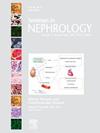Accessibility to Kidney Replacement Therapy in Latin America
IF 3.5
3区 医学
Q2 UROLOGY & NEPHROLOGY
引用次数: 0
Abstract
Latin America is made up of 21 countries with a population of around 660 million, of whom 550,000 receive kidney replacement therapy (KRT). The enormous burden of disease that KRT imposes can be attributed to multiple determinants of the disease, linked to the characteristics of the population: co-morbidity, social factors, limited access to the health care system, poverty, extreme working conditions, and low levels of education. In many countries, the health care system is fragmented, making it difficult to ensure the continuity of the health care process and to adress inequities in access to KRT. Differences among countries in the prevalence of KRT translate into thousands of lives lost each year. Differences in access to KRT are linked to structural and investment differences in health care systems, so financing and organization characteristicsmight have a major bearing on equitable access to KRT. One of the main objectives of the nephrology community should be to develop activities to reduce gaps in the burden of KRT. There is no doubt that alliances with health care policy makers, ministries of health, regional patient organizations, regional nursing organizations, health regulatory agencies, and international nephrology societies will achieve results by working together, in synergy.
拉丁美洲肾脏替代疗法的可及性。
拉丁美洲由21个国家组成,人口约6.6亿,其中55万人接受肾脏替代疗法(KRT)。KRT造成的巨大疾病负担可归因于该病的多个决定因素,这些因素与人口特征有关:合并症、社会因素、获得卫生保健系统的机会有限、贫困、极端工作条件和低教育水平。在许多国家,卫生保健系统是分散的,因此难以确保卫生保健进程的连续性和解决在获得KRT方面的不公平现象。各国之间KRT流行程度的差异导致每年有数千人丧生。获得KRT的差异与卫生保健系统的结构和投资差异有关,因此融资和组织特征可能对公平获得KRT有重大影响。肾脏学界的主要目标之一应该是开展活动,以减少KRT负担方面的差距。毫无疑问,与卫生保健决策者、卫生部、区域患者组织、区域护理组织、卫生监管机构和国际肾脏病学会结成联盟将通过协同合作取得成果。
本文章由计算机程序翻译,如有差异,请以英文原文为准。
求助全文
约1分钟内获得全文
求助全文
来源期刊

Seminars in nephrology
医学-泌尿学与肾脏学
CiteScore
5.60
自引率
0.00%
发文量
27
审稿时长
6-12 weeks
期刊介绍:
Seminars in Nephrology is a timely source for the publication of new concepts and research findings relevant to the clinical practice of nephrology. Each issue is an organized compendium of practical information that serves as a lasting reference for nephrologists, internists and physicians in training.
 求助内容:
求助内容: 应助结果提醒方式:
应助结果提醒方式:


